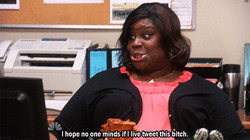|
This is on my experience with balancing efforts to increase diversity in a homogeneous academic field and doing the science research I love. If you have thoughts, please share in the comments.
For the last few weeks, I’ve been shelving my hobbies (writing, painting, making stuff out of other stuff) in lieu of a new task, one that isn’t at all a hobby, but is definitely not part of my job. My job as a graduate student is to absorb knowledge and skills from as many places as I can, to translate what I’ve garnered into some new knowledge, and to put that knowledge into the world as published research. (For context, I also buy and sample international variations on the cheese puff and I watch what my mother would call 'television that does not edify the mind', so it’s not all fun and games.) I do research because I love it and I think it makes me better. I do research because I like to think it might make the world better.
14 Comments
There was no Summer Jam blog series. I'll come out and say it because I dropped that ball like the sweaty-palmed non-athlete that I am. So there. But I have some other thoughts for you. This post could also be called "Sue Pierre's: Why Did I Get Accepted 2". That's a Tyler Perry reference for those who don't like garbage cinema.
This semester has been a bunch of things to me. It was mostly a time of transition and realizing (but when are we not doing those things?). It was pain and relief too close together to tell apart. Through this semester, I’ve been served a few lessons and one that I want to talk about here, mostly a note to myself. I switched lab groups. I started a new advising relationship. I worked more independently than ever, and didn’t fail. I published my first paper. I became a mentor. I decided that academia does not equal success. I looked around me and noticed that I’m not the only one who’s feeling exhausted and tired of this grind. And that despite my exhaustion, the reasons to persevere persist. They’re there.  My life, both as a Graduate Student and as A Human in The World, has been sort of chaotic of late, leading me to avoid trying to sit down and get my thoughts about the things happening to/because of me into an intelligible format. Not just an intelligible format but more importantly, one that matters to anyone besides my personified diary. Diary: It’s been a while Sue, girl. Tell it how it is! Let it all out. Don’t even worry about how it will all sound. This is a safe space for your tender grad student underbelly. Sue: Diary, thank you so much for saying that. You’re always so available and I love that I can imagine you as Donna from Parks and Rec and not feel like I’m perpetuating stereotypes in this safe space. Diary: Whatever, girl, I will be as sassy and supportive as you need me to be. All you have to do is write some sentences in me, at some point. Just a few. Sue: (Fidgeting with a melting tub of ice cream) I’m really sorry I’m so busy right now I can’t write about my life but thanks again for reminding me, you’re literally the greatest. *Sheepishly opens Netflix* Diary: -_____- Scandal, really? Basic. I've been happily plodding along, hopeful and unaware, towards what I thought would be my first published paper. It's nothing big, nothing earth-shattering, but it's mine (and a few other people's), and I've been working at it for so goddamn long (relative to the rest of my life). But it recently occurred to me, halfway through the process of responding to reviewer comments, that my data may be have been misrepresented by the statistical analyses I used. Misrepresented. I'm going to let you sit with that for a minute because it took me over an hour to move past this fact. My interpretations and conclusions in my already-peer-reviewed paper might be bullshit, and this alters the message of the paper I've already submitted.
I sat in my office nearly the entire day, hardly moving, rapidly typing, deleting and retyping R code to try and figure out where things went wrong. By the end of the day I was exhausted, hella cranky, and still wanting for answers. More than anything, I was worried about what the senior scientist with whom I'm collaborating would think. We were 3 days away from our resubmission deadline, my conclusions had suddenly seemed as valid as a snowball on the Senate floor, and I was unable to decide whether to press on or retract the questionable data. Though the other two problems still exist, the last one is no longer an issue. It took me a few minutes of hand-wringing and light whining to realize that I can't publish something that I doubt. I'm disappointed with the current situation, but I'm coming away with a lesson in science ethics. You just don't put something out unless you're data say it's true. As for my paper, she will eventually see the light of day, but I need to do a bit more tinkering before her debut. I'm trying to think of it as progress, not failure. |
IntentTo document interesting ideas about science and nature and reflect on the experience of being a scientist from the margins. Archives
March 2021
Categories
All
|
 RSS Feed
RSS Feed
